
Why you (won’t) vote – A reading list
In November, the Dutch will elect a new parliament. Not all eligible citizens will go out and vote, however. How can this be explained, and how big of a problem is it? International research into voter turnout can shed new light on this issue – and offer possible solutions.
All books on this reading are available in the collections of Leiden University Libraries, or can be found online. All books from our collections can be borrowed by following the link under the title of the book, or by searching for the title, author or theme in our Catalogue.
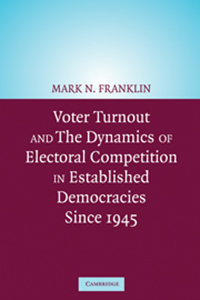
M.N. Franklin, Voter Turnout and the Dynamics of Electoral Competition in Established Democracies since 1945
2004
This is a good starting point for research into voter turnout. Franklin compares an astounding 22 countries, and identifies similar developments. In many countries, voter turnout is declining. This does not mean that citizens are less interested in politics or less active in their communities. Not the voters, Franklin states, but electoral systems have changed.
Franklin identifies two main factors that influence voter turnout. The first is habit formation. In many countries, turnout has declined since the voting age has been lowered to 18 years. Adolescents, Franklin implies, are confronted with so many new things in their lives, that it is a bad time to become accustomed to voting. Interestingly, Franklin speculates that lowering the voting age even further, to 16 – and have youths vote for the first time in a high school setting -, could reverse this trend.
The second factor is that voters must have something to choose. In many countries, Franklin sees that the central parties have grown more alike, while election campaigns have become rather boring events. Clearly, Franklin wrote his book before Trump and the Brexit vote. Either way, voter turnout will increase when voters believe that they can actually make a difference. Because of its sharp analyses and strong empirical foundation, Franklin’s book is a standard work in the field.
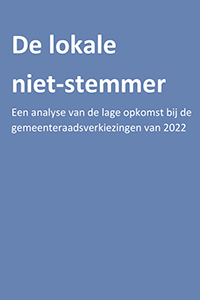
H. Vollaard et al (red.), De lokale niet-stemmer: Een analyse van de lage opkomst bij de gemeenteraadsverkiezingen van 2022
2022
Despite fierce political debates and polarization in national politics, Dutch voter turnout for local elections reached a low point in 2022. How can that be explained, is it a problem, and what can be done about this? These questions stand at the heart of this report.
Although it asks big questions, the answers are nuanced and precise. The report discusses various factors that influence voter turnout (age, gender, education, urbanization). It also discusses the reasons that citizens offer for not voting, and how voters think about these reasons.
According to the authors, low turnout is worrying, even though a high turnout is not automatically a sign of a healthy democracy. The latter revolves not so much around turnout rates, but around the relation between voters and politicians. Once that relationship improves, the authors claim, turnout will also rise.
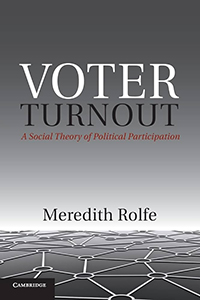
M. Rolfe, Voter Turnout: A Social Theory of Political Participation
2012
How do citizens decide if they will go out and vote or not? Statistical research often approaches this question as a matter of individual choice, and looks for common characteristics among (non-)voters: they are often older, well-educated, live in cities, etc.
Rolfe takes a different approach. She sees voting/non-voting not as an individual choice, but as a social act. People who vote are often part of a social network in which politics is discussed passionately, or that facilitates political activities. Being part of such a group makes it more plausible to vote.
This book challenges many statistical approaches, because Rolfe provides ample empirical evidence and sophisticated mathematical models to back up her claims. Her work also leads her to a conclusion: voting is part of participating in political processes. It is there that people need to be stimulated. A sole focus on voter turnout will always be ineffective.
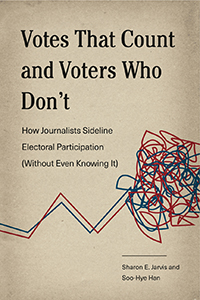
S.E. Jarvis en S-H. Han, Votes That Count and Voters Who Don’t: How Journalists Sideline Electoral Participation (Without Even Knowing It)
2018
How are voters described by the media? And what influence do these descriptions have on voting behaviour? {wil je Engels of Amerikaans?] Are voters described as well-informed, independent citizens with a central role in politics. Or as pawns in a political game who are manipulated by political elites and incapable of making well-considered decisions?
In Votes that count, Jarvis and Han show how the media image of the voter in the US has changed over the past century: from assertive citizens to pawns in a political game. They subsequently argue that this change has had major influence on voter behaviour: people are ever less inclined to go out and vote.
Based on solid research, Jarvis and Han show how the media influences voter behaviour, and make a case for a different, more responsible media approach to voting.

D.S. Hillygus and John B. Holbein, Making Young Voters: Converting Civic Attitudes into Civic Action
2020
If declining voter turnout is bad for democracy, it is time to think about solutions. This book does exactly that. And it focuses on one specific group of potential voters: young people living in the US.
The research of Hillygus and Holbein shows that young non-voters are often interested in politics. Even more so, they often intend to vote, but for various reasons don’t follow-through. Based on this information, they propose a number of practical solutions to increase voter turnout.
For example, high school civics courses should help youths to register to vote, or registration could be combined to registering your driver’s license at the DMV. Either way, the rules and procedures for registering should be simplified.
In its practical take, book breathes a can-do attitude. Its proposals are, however, mainly tailored to the US, which has a very different voting system than European democracies.
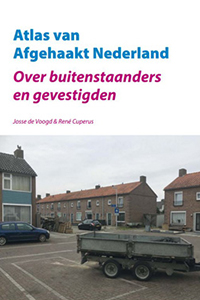
J. de Voogd en R. Cuperus, De atlas van afgehaakt Nederland. Over buitenstaanders en gevestigden
2021
Who are the Dutch non-voters? Have they turned their backs to the political establishment, are they simply not interested, or do they harbor a fundamentally different view on politics? In this report, De Voogd and Cuperus see a combination of the three.
They emphasize the social characteristics of non-voting and ‘dropping out’ of politics. Social differences – in education, income and health – influence social-political attitudes and political preference. People who are (or feel) deprived of social wealth, more often turn their backs on politics, or give their vote to anti-establishment parties. This does not per se mean that they are not interested in politics; they often have a fundamentally different view on society’s problems and potential solutions.
This atlas does not only analyse social inequalities and its effects voting behavior, it also maps it. In doing so, it provides a national geography of voting behavior, next to five detailed local analyses.
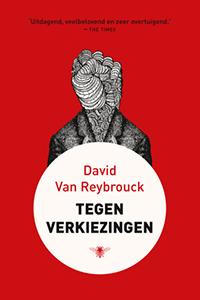
D. van Reybrouck, Tegen verkiezingen
2015
Voting is only one aspect of political participation. Even more so, several of the abovementioned authors warn against equating turnout with political participation. High turnout rates alone do not guarantee the health of a democratic regime.
Van Reybrouck takes this argument a step further in his pamphlet Against elections. According to him, the present parliamentary democratic system has given way to inefficient government, politization, and short-term thinking. A different form of democratic participation is necessary to save the system.
He proposes to install citizen councils, with its members being selected by drawing lots. After all, if elections are based on the idea that every citizen can make well-informed political decisions, than everybody should have a chance to be part of the political process. Citizen councils, Van Reybrouck holds, will lead to true representative democracy, in which everyone has a chance to participate, to make their voice heard, and to make a real contribution to decision making. And to strengthen his argument, he refers to the long history of such democratic systems, ranging back to ancient Greece.
Against elections has incited fierce debates, as well as actual follow-up. Various city governments – among them Rotterdam – have started experiments with citizen councils. Their strengths and weaknesses are still being discussed. In the context of voter turnout and political participation, it is an important trend to follow.
Contact us
Do you have questions about borrowing the books above? Is a book missing on this list, or would you like the UBL to purchase a book that is not yet available in our collections? Contact us via Ask a Librarian.
